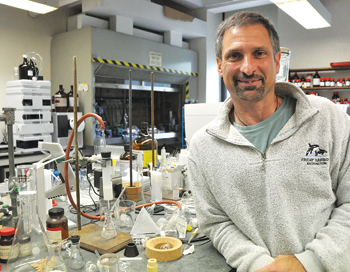Martin Di Grandi, Ph.D., FCRH ’84, has diseases on his mind.

Photo by Patrick Verel
But Di Grandi, assistant professor of chemistry, is not interested in prescribing medicine to patients who have HIV infection, cancer or Hepatitis C. Instead, he creates the compounds that can be the basis for new medicine.
“I basically play with a molecular Lego kit. I get these small pieces like you get in Lego kits, except they’re individual molecules. Then I string them together to make bigger molecules,” he said.
“The bigger molecules that I’m trying to make usually have some biological property that can be optimized or somehow improved—whether it’s in terms of potency against a target, or giving it better properties that make it more like a drug.”
Di Grandi joined Fordham last year after working for 17 years at Wythe Pharmaceuticals. The change was jarring at first, but now he says his only regret is that he didn’t make the move sooner.
“There are clearly differences in the ways universities are run and the way corporate America is run, but once [I] got around those and learned to live within the means of the University, I loved [it],” he said.
“I love interacting with students and having the freedom to pursue my own research interests, a situation that, to some degree, I didn’t have when I worked for a drug company.”
Part of organic chemistry, his area of expertise, involves isolating compounds from natural sources such as plants, flowers, leaves, and barks, and then screening them to see if they affect models of diseases. The pharmaceutical industry has shifted away from such research in recent years, said Di Grandi, but there are still a lot of individual researchers who publish new compounds that they have isolated from natural sources.
“My interests have always been in biologically active molecules and synthesis, so I went back to my roots, and now I’m looking back at natural products that have interesting biological activities,” he said.
Now that Di Grandi is out of the private sector, one of the challenges that he faces is finding collaborators. Once he verifies that a compound he has created is pure, its structure would normally be analyzed by a group of private industry scientists. Next, biologists would screen it in their assays and together, they would analyze the generated biological data associated with this compound.
This process would all be done in-house at a drug company, but it is not feasible at a university, he said.
Di Grandi hopes to collaborate with a couple of his former co-workers— who, like him, have moved on to academia—in an effort to try for larger grants from the National Institutes of Health.
Di Grandi’s interest in antiviral and anticancer drugs stems in part from an urgent need for new treatments for these diseases. But there’s a visual aspect to his work as well.
“When I look through articles, the titles themselves could be of interest, but as soon as I get the actual ‘pdf,’ the first thing I do is scroll through to look for structures and see if they catch my eye. In the three instances that I mentioned (cancer, AIDS and Hep C), these are three structures that caught my eye,” he said.
Teaching organic chemistry to undergraduates is also a major aspect of his job. It’s one that he relishes, even if the subject strikes fear into the hearts of many pre-med students.
While learning about the subject may seem paramount, Di Grandi said that students are also learning how to think, and how to apply newly acquired problem-solving skills based on scientific theory.
“I explain to them, ‘You may never think about organic chemistry again after you walk out of my classroom. But the way you learn to handle problems in my class or lab is going to be very much like what you’ll be doing when you’re sitting in your office with your shingle on the wall, listening to your patients telling you what’s wrong with them.’”
Collaborating with undergraduates on research brings Di Grandi back to his days as a sophomore at Rose Hill, when he decided he wanted to get his doctorate in chemistry.
“A lot of times you get taught things in class and you have no idea what their real value is until you see a real-world application of it,” he said. “Had I not started doing research as an undergraduate, who knows where my life would have gone?”
